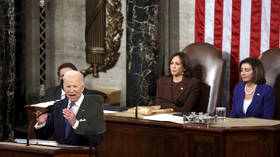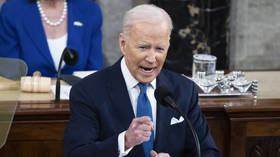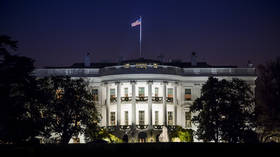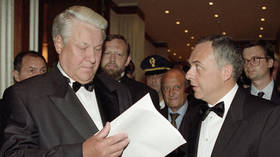On Ukraine, Biden’s State of the Union address was just ‘good vs. evil’

Biden’s simplistic “good versus evil” pronouncements on the Russian-Ukraine conflict did little to prepare America for the consequences of declaring economic warfare against the Russian state.
It wasn’t surprising that Russia’s ongoing military incursion into Ukraine topped the list of issues addressed by US President Joe Biden in his first State of the Union (SOTU) address, delivered on March 1, 2022, to a joint session of Congress.
Biden pitched the Ukraine crisis as a defining moment in modern history, a problem that could only be resolved with American leadership, both at home and abroad. His job during his address was to convince both domestic and foreign viewers alike that he was the man for the job.
He repeated the time-tested mantra that held that Russia and its president, Vladimir Putin, constituted a threat to democratic principles at home and abroad. This was especially true, he said, when it came to Ukraine.
There was nothing new in what Biden told his audience – the same words and themes had been deployed many times over in the past week. He pushed the same buttons – Putin as the personification of “autocratic oppression,” leading a Russia addicted to power, hell-bent on forcefully absorbing the nation of Ukraine into the Russian orbit.
He likewise pulled at the heartstrings of America, talking about Ukraine’s embattled leader, Volodymyr Zelensky, and the heroic resistance of his people in the face of overwhelming Russian power. The United States stood fully behind them, Biden said. This sentiment was shared by many in the audience as the president spoke. They held small Ukrainian flags or wore the nation’s blue-and-yellow colors. But this support, he said, had its limits – the US, he declared, would not send a single soldier to Ukraine to fight for its cause.
The fact was, Biden was abandoning it to its fate. While praising the courage and leadership of the Ukrainian president, he said, “Let me be clear, our forces are not engaged and will not engage in conflict with Russian forces in Ukraine. Our forces are not going to Europe to fight in Ukraine, but to defend our NATO allies in the event that Putin decides to keep moving west.”
There is no evidence that Russia intends to “keep moving west.” And while Biden spoke of the important leadership role played by the US in Europe, the fact remains that Europe is a veritable prisoner to the whims of any US president, whose pronouncements take on the weight of law whenever they are uttered.
Neither Europe nor the United States, it seemed, would be intervening on behalf of Ukraine against Russia. Zelensky and Ukraine were on their own, their only choice for national relevance being to commit suicide on the international stage while the West, from the safety of their homes and offices, cheered them on like bloodthirsty Romans watching gladiators do battle in the Colosseum.
The major takeaway from Biden’s SOTU address? Ukraine will lose this war, and the West will do nothing to stop that fact.
While Biden lionized Ukraine and its beleaguered president, he failed to explain to the American people why there was a war, beyond the sophomoric argument that “Putin did it.” No talk of America’s role in the Maidan back in 2014, no discussion of the role played by Ukrainian right-wing ultra-nationalists in oppressing the Russian-speaking population of Ukraine, no mention of the shelling of the breakaway Donbass region, no discussion of the role that NATO expansion played in creating an untenable security situation for the Russian state.
Simplistic jingoism plays well in atmospheres such as televised political addresses, where a captive audience is compelled to rise and applaud made-for-TV pronouncements lest they be singled out for public criticism by a fawning, vindictive corporate media. The cheer-fest the SOTU has become would give any Brezhnev-era meeting of the Presidium a run for its money when it comes to mindless standing ovations.
But it was here, in the orgy of self-congratulation that is the interplay between president and Congress where America’s weakness in its conflict with Russia was exposed. As united as everyone seemed to be about sacrificing Ukraine on the altar of Russia-bashing, it was clear Congress was deeply divided from Joe Biden on issues of domestic policy, especially when it came to the economy of the US. While the US president may not want to engage Russia in a shooting war in Europe, he has embarked on a great global crusade to destroy it economically. And the tepid response the political opposition gave to his pronouncements underscores the reality that the US is not prepared for the consequences of his declaration of open economic war with Russia.
Let there be no doubt: Russia will win the shooting war in Ukraine. This outcome is inevitable, given the reality that Ukraine has been abandoned by its erstwhile partners in the West. Yet the conflict between Russia and the West won’t end when the last bomb explodes on Ukrainian soil, but when, in the mindset of the US and its European partners, the Russian economy is destroyed and Putin is humiliated and diminished as a political force, domestically, regionally, and globally.
Here, the US president did the American people a great disservice, selling them a feel-good struggle in which Ukraine is promoted as the glorified martyr and Russia demoted as the evil oppressor. A bloodless conflict – from the US perspective, at least – that will be won simply by shutting down the Russian economy by remote control. It won’t be that simple.
Russia has yet to respond to the US-led economic war being waged against it. When it does, rest assured that these sanctions Congress so enthusiastically applauded will prove to be a double-edged sword – one that will cut into a US economy still reeling from the consequences of the Covid pandemic. When that time comes, President Biden could find that many of those politicians who rose to their feet to cheer on the sacrifice of Ukraine will turn on him.
War, it is said, is but an extension of politics by other means. Given the deep partisan political divide that exists in the US when it comes to the economy, it is clear neither Biden nor the American public is ready for what is about to happen when the consequences of their anti-Russian hysteria finally comes home to roost.
The statements, views and opinions expressed in this column are solely those of the author and do not necessarily represent those of RT.

















